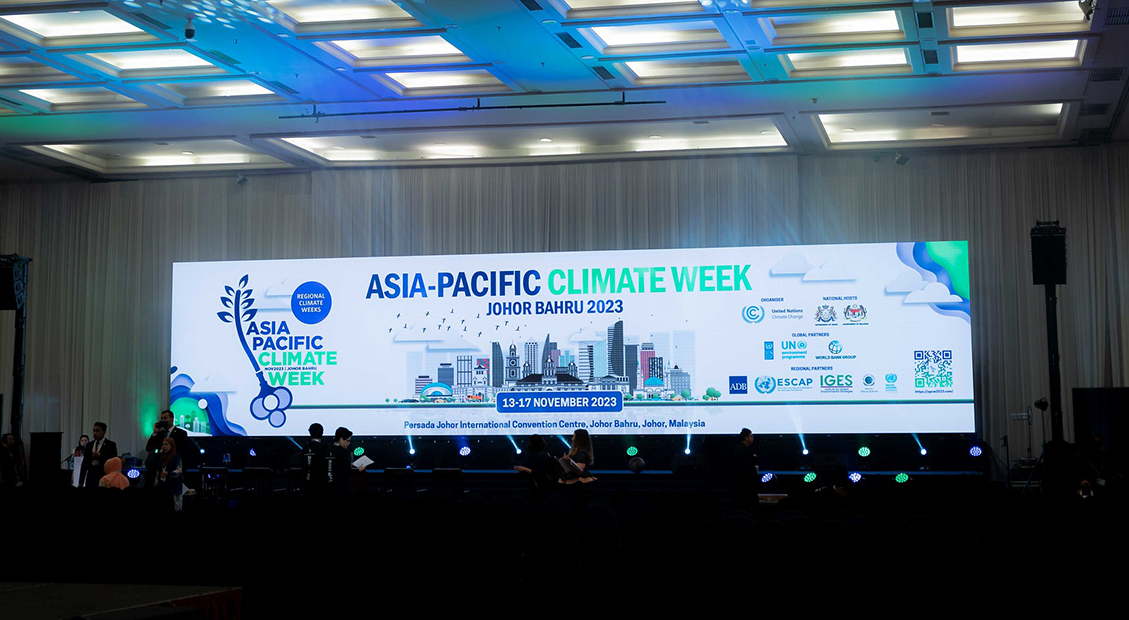- COP28 will be held from Nov. 30 to Dec. 13, Parties and Non-Party Stakeholders will come together in Dubai to discuss a number of issues around global stocktake, USD100 billion developed country pledge, financial reforms, loss and damage, among other issues.
- Ahead of COP28, a series of regional climate conferences are held. The Asia Pacific Climate Week was held in Johor, Malaysia from Nov. 13 to 17, with policymakers, practitioners, businesses and civil society sharing best practices, exchanging ideas and building momentum before the big finale in UAE.
- As Asia’s climate partner, AIIB is proud to participate in the Asia Pacific Climate Week, learning how we could best help in low-carbon and resilient transition in Asia Pacific.
The average annual climate finance flow doubled for the period 2021-2022, finally surpassing the one trillion dollar mark (USD1.27 trillion). However, this is far from enough. According to the last Climate Policy Initiative report, the climate finance need is around USD8.1 to USD9 trillion annually until 2030, jumping to over USD10 trillion beyond 2031 and until 2050, in an average scenario.1
With the climate COP less than 10 days away, it seems like the world is revolving around climate. This year is especially important, not only because of the expectations for resolving legacy issues such as loss and damage funding mechanisms, USD100 billion financing pledge from developed countries, the multilateral development bank reform, the global goal on adaptation, but more importantly, on issues such as the global stocktake and other newly introduced pledges such as tripling renewable power by 2030.
As Asia’s Climate Partner, the Asian Infrastructure Investment Bank (AIIB) is proud to have participated in the Asia Pacific Climate Week, exploring how we could better support our public and private partners in financing where it is most needed. The primary objective of the Regional Climate Weeks (RCW) is to unite a wide range of stakeholders to achieve the goals set out in the Paris Agreement, fostering practical discussions and sharing expertise and best practices across regions. This year’s RCW focuses on contributing to the global stocktake in four tracks: energy systems and industry; cities, urban and rural settlements, infrastructure, and transport; land, ocean, food, and water; and societies, health, livelihoods, and economies. Hundreds of events were held simultaneously by United Nations Framework Convention on Climate Change and its partners, revolving around the four tracks with a focus on the region.
As the main operating region of AIIB, Asia is vital to progressing the global effort to address climate change given its climate vulnerability, emission representation, and economic potential. The Asia Pacific Climate Week is an opportunity for the Bank to build local knowledge, build local connections and develop vital networks. AIIB is proud to have participated in exploring opportunities for policies and finance to help the energy sector decarbonization process in the panel “Effective Policies and Finance as Catalysts to Accelerate and Facilitate Just Transition in ASEAN,” discussing the Role of Multilateral Development Banks as an important source of finance for low-carbon transition pathways in the emerging economies. This serves as an important piece of the puzzle in building up to COP28, where we will focus on the following three priorities:
KEY THEME 1: Develop strong partnerships to boost climate action
- Bridge across public, private and philanthropic sectors and actors, through bespoke platforms and solutions.
- Work at the country, regional and global level, with clients at the center.
KEY THEME 2: Deliver holistic approaches to maximize client benefits
- Break the siloed approach to climate mitigation, adaptation and nature to maximize cobenefits.
- Focus on maximizing positive economic opportunities from the low-carbon transition process.
KEY THEME 3: Boost tailored innovation for greater impact
- Pioneer and replicate innovative financing structures and products tailored to client needs.
- Promote the development and adoption of new technologies.
Find out more from the AIIB at COP28 Program.
[1] CPI Global Landscape of Climate Finance 2023
https://www.climatepolicyinitiative.org/publication/global-landscape-of-climate-finance-2023/


